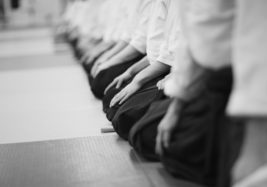Trauma and martial arts
How martial arts can help heal trauma
What is trauma?
Trauma is the experience of severe psychological and physiological distress after having been exposed to an intensely frightening event or series of events from which the sufferer was unable to escape. A whole host of life events can lead to trauma, and whether or not they do depends a lot on the individual’s situation and past history.
Trauma can have wide ranging and long lasting effects on all aspects of the body and mind. In some cases trauma overwhelms our ability to cope, and the resulting symptoms can be debilitating. Stress hormones flood our system on a semi permanent basis and this can result in a variety of symptoms including:
- Insomnia
- Being hypervigilant or constantly on guard or high alert
- Decreased concentration, inability to focus.
- Irritability
- Anxiety and panic
There are many other effects that trauma can have on all domains of a person’s life and functioning. Of course many of these depend on the nature of the trauma and the life of the individual but some of common effects include:
- Nightmares
- Flashbacks/intrusive memories
- Shame and self-loathing
- Self-destructive behaviours
- Physical symptoms, chronic pain, headaches, digestive issues
- Depression
- Feeling numb
- Coping/avoidance strategies such as disordered eating or drug/alcohol use
At the time of the event, the brain suspends its normal operations and copes as well as it can in order to survive. If there is no opportunity to fight or flight, there might be a freeze response and a dissociative state. Traumatic memories are not processed and stored in an ordinary way and often fail to be permanently filed away in ‘long term memory storage’. As a result of this, the survivor can keep experiencing them as vividly as the original event (flashbacks) and the lines between past and present become blurred.
So trauma is a whole system issue. Not a ‘mental health issue’. It involves every cell of the body, as well as the endocrine (hormonal) and nervous systems. In order to start processing the traumatic memories and restore balance to these systems, these physiological aspects need to be addressed first. We cannot begin psychological treatment without being very aware of the whole body and all the elements at play.
How can martial arts benefit trauma survivors?
There is a lot of evidence pointing toward the benefits of a variety of physical disciplines in the healing of trauma, particularly yoga (see among others Van Der Kolk- 2014). There hasn’t been much research about the efficacy of martial arts in this context, but I think it is quite clear that some of the benefits of yoga apply to martial arts, as well as the latter having some unique benefits of its own.
Learning to inhabit your body
Trauma survivors often lose touch with their bodies. They literally cannot feel entire areas of their bodies. They become numb and disconnected. Often the sensations they do feel are unsettling and unpleasant. Most people who suffer from PTSD (post traumatic stress disorder) no longer experience their body as a safe place. They are unfamiliar with and dissociated from their bodies and cannot find safety and relaxation anywhere. Martial arts, as well as other physical disciplines such as yoga, dance and drama, helps people to land back into their body. These practices can help people to re-familiarize with their bodies and ground themselves.
Martial arts focuses explicitly on integrating body and mind. On bridging the gap that may exist between the two. More so than other sports it promotes whole body awareness and an intricate connection between spirit and physical expression. If taught properly, practitioners eventually learn to move from their centre (hara/dantien), rather than from their upper body, which will reconnect them to their innate experience of safety and groundedness. Using your body in a purposeful and powerful way can help overcome sensations of panic and anxiety and replace them with an experience of strength and skill.
Using your breath to regulate your system
The capacity to regulate your breathing is essential to recovery from trauma. Many people who have suffered trauma have a breathing pattern that is very restricted and very shallow. They often breathe in a paradoxical manner (meaning their diaphragms move upwards instead of downwards on the inhalation which leads to less oxygen being taken in- which often results in fast breathing or hyperventilation).
Trauma survivors often find themselves in a state of hyper-arousal, anxiety, panic (or sometimes hypo-arousal- numbness). Controlling the breath is a very important tool in regulating the automatic nervous system, which in turn controls your level of arousal. When you breathe in, you activate the sympathetic branch of the nervous system, which has an energising effect. When you breathe out, you calm the system (activating the parasympathetic branch). Becoming aware (even if not consciously) of the power of the breath to regulate your arousal levels is a powerful tool in restoring balance to the system.
Mastering your breath is a very important part of martial arts. If you are not conscious of your breathing and control it appropriately, you will not be able to sustain yourself and your energy throughout the intensity of training. Often this aspect of physical development is implicit and happens semi-consciously, but your body will make sure that it maximises its access to energy sources by breathing appropriately.
Similarly, having to deal with nerves or adrenaline in a competition or grading situation (let alone an actual conflict scenario) forces you to access the breath as a tool for calming yourself.
Accessing your inner strength
People who suffer from PTSD have had their resilience broken down. The trauma has overwhelmed their capacity to cope and bounce back. Martial arts gradually builds up this resilience. Pushing your personal boundaries is combined with respecting and asserting those boundaries. Meeting this challenge gets you in touch with your own innate source of power. Growing and mastering the ability to use your body in way that generates so much energy and force slowly builds an inner source of strength that is reliably available to draw on in all situations of life.
As you progress and build your skills in martial arts, you will start to feel increasingly strong, assertive and solidly confident. The feelings of shame, being wrong and being worthless, that so often are the result of trauma, especially interpersonal trauma, begin to be challenged by the experience of strength and skill. Martial arts training, builds a certain amount of inner and outer toughness that is combined with sensitivity, awareness and respect that helps build up your tolerance for distress and discomfort in other situations. This is an essential skill if you are recovering from trauma. As trauma expert Bessel van Der Kolk (2014, p. 209) points out: “Learning to observe and tolerate your physical reactions is a prerequisite for safely revisiting the past. If you cannot tolerate what you are feeling right now, opening up to the past will only compound the misery and retraumatise you further.”
Martial arts training is perhaps particularly appropriate for those trauma survivors who have suffered a personal attack, assault or rape. Martial artists learn to be very assertive about their personal boundaries and express an experience of strength and solidity in a very concrete and embodied way. This can help diminish a survivor’s sense of vulnerability and fragility and build their confidence to face the world again.
Of course when working with survivors of personal attack or assault, martial arts may have to be taught in a more sensitive manner as some of the training exercises or drills may be very triggering.
Mindfulness
People who suffer from trauma often are disconnected from the present. They live in their minds, stuck in a suffocating past, or distracting their minds with obsessive worrying about the future and all the ways in which things could go wrong. Traditional martial arts have a strong focus on being present in the body, putting your mind in your body, so to speak. While never explicitly talking about mindfulness, this state is implicit in the practice. When you practice, your mind cannot be anywhere else than right here. If you want to be effective, you need to be fully awake to what is happening right now. Otherwise you’ll find yourself very quickly with your butt on the floor.
So, in summary…
Martial arts combines centred grounded movement, focused on maximising bodily control and effective generation and transmission of power, with mind-body integration and awareness. Not only does this help tremendously with whole system regulation, all these factors combined promote an experience of strength, mastery and confidence that is hugely beneficial to people recovering from trauma. As well as all of that, being part of a supportive dojo can give the practitioner a sense of belonging and community as well as a feeling of purpose and meaningful occupation that are allies on the road to whole system health and wellbeing.




